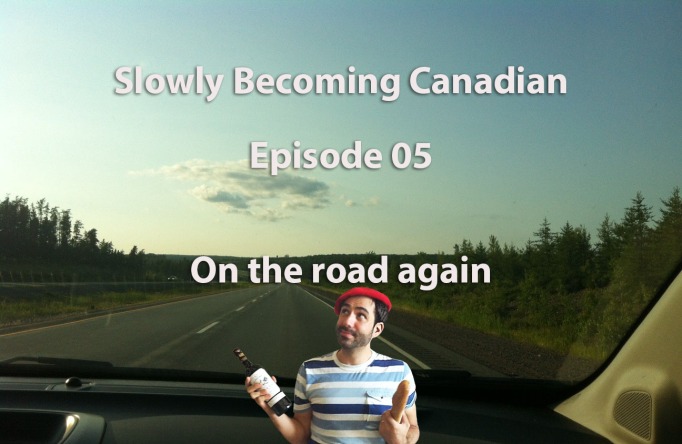Have a look at these expressions. If, like me, Nova Scotian is not your mother tongue, take notes.
“Traffic on the highway was crazy “
What you think: Traffic on the highway WAS crazy, cars were bumper to bumper and it took 45 minutes to drive 10km.
What Nova Scotians mean: “The 102 was really busy! I had to pass three cars on my way from Truro to the city [read Halifax, because it’s the only city in the province] and people were driving sooo fast [cruise control stuck on 119km/h]. There was so much traffic that a guy who was trying to merge had to completely stop on the ramp [more because he didn’t KNOW how to merge]. I wanted to get home so badly that I didn’t even take the time to stop at the Tim Horton’s at Exit 9.”

The 102, incredibly busy as usual
“There are sales at the liquor store!”
What you think: What do they mean by “the liquor store”? Just go to the supermarket or the corner store! And you know you can get 26 beer for 12 euros ($18), right?
What Nova Scotians mean: “2-4 are $1 off!! Aaaand you also get 3 airmiles! So, not only do you get some of Sir Alexander Keith’s love for ONLY $41 but you also get a LOT closer to your next holiday destination. Sweet!”

Wine doesn’t need to be on sale in France to be affordable
“I’m going to Maine”
What you think: They are going to visit a place that just looks like a giant forest. They are probably going to stay in a beautiful giant house on a beach and watch the sunset over the ocean, at least that is what you have seen in movies. You are also a little worried for them: you suspect that the whole state is haunted and that everybody there is crazy because you read a lot of Stephen King novels.
What Nova Scotians mean: “I’m actually only going to Bangor for a couple days. I’m going to shop the whole time, with some friends who, like me, think Target USA is waaayy better than Target Canada. I know it’s August and I could go to a sunnier destination but I’ll get all my Christmas shopping done! I’ll have to pretend everything I have in my luggage is old and remove all the tags when I come back to Canada but all the tags will already be removed when it’s time to wrap the presents! Plus, I wouldn’t mind getting some cheap booze, there haven’t been any sales at the liquor store for a while…
“It’s such a nice day”
What you think: It’s sunny and at least 25 degrees and not a single cloud in the sky. It’s such a perfect summer day to put some shorts and sunglasses on, go for a swim and enjoy a drink or an ice cream on a patio!
What Nova Scotians mean: The sky is not that grey, it’s 10 degrees and it hasn’t rained for four hours. It’s such a perfect summer day to put some shorts and sunglasses on, go for a swim and enjoy a drink or an ice-cream on a patio!
“Tatamagouche”, “Antigonish”, “Shubenacadie” or “Mushaboom”
What you think: You really, really have no idea what they are saying. This person must be drunk because they are seriously sluring some words.
What Nova Scotians mean: You’re refering to lovely places in your favorite province and you don’t know why this Come From Away is looking so confused. You even made an effort to say the entire name, usually you just say Tata, the Nish or Shubie.
Some of these (OK, all of these) are a little cliché and I’ve never completely misunderstood someone who used them. They are just part of the little cultural differences that make me love Nova Scotia even more.
Oh, and if you knew that there is no Tim Horton’s at Exit 9 between Halifax and Truro, you definitely are a true Nova Scotian.
If you speak Nova Scotian you might be able to help me with this: Who’s Buddy and why does everybody know him?
Ok, you speak Nova Scotian, but do you know Nova Scotia better than a Come From Away? Take this quiz and find out.
Like Slowly Becoming Canadian on Facebook

Nova Scotia : One of my favorite places



